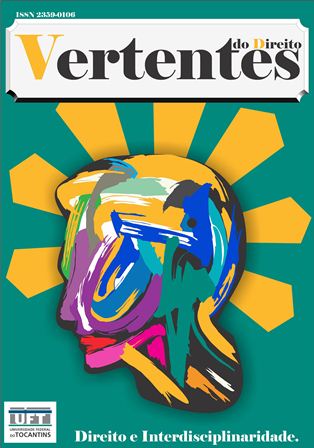CRIMINAL LEGAL WELL AND CULTURE IN CARLOS COSSIO: THEORETICAL FUNDAMENTALS FOR THE TYPICAL REFORMULATION OF ART.268 CRIMINAL CODE
DOI:
https://doi.org/10.20873/uft.2359-0106.2021.v8n2.p408-425Keywords:
Bem Jurídico Penal, Estado democrático de direito, Axiologia, Covid-19, Código penalAbstract
In view of the inevitability of a dogmatic criminal construction teleologically aimed at achieving a Democratic State of Law capable of coexisting with a Criminal Law compatible with the dignity of the human person, the existence of what the academy calls the Legal - Criminal Property becomes salutary Thus, an evolutionary perspective of the notions of Legal-Criminal Property was approached, so that one can theorize about the function of the Legal Property and its influence regarding the legal effects of Covid-19 in Brazil. After the historical approach, Carlos Cóssio's egological theory is detailed, detailing his axiological perspective of law and the reflexes that temporality, added to the new needs of society, can / should influence the current rules, in manifest relation with the three-dimensional theory. of the right. Such a study has the power to guide a possible modification of art. 268 of the Penal Code with a view to safeguarding the national order and the systematic compatibility that must exist in our legal system.
References
ALMEIDA, Bruno Rotta. Tutela Penal de Valores Supraindividuais? Reflexões A Partir da Importância da Teoria do Bem Jurídico para a Ciencia Penal. Rev. Direito Unifacs. Facs, v.1, nº10, 2009. Disponível em: https://revistas.unifacs.br/index.php/redu/article/view/712. Acesso em: 19/10/2020
BRANDÃO, CLAUDIO. Bem Jurídico e Norma Penal: A Função da Antinormatividade na Teoria do Crime. Rev. Delictae: Revista de Estudos Interdisciplinares sobre o Delito, v. 3, nº. 4, 2018. Disponível em: http://www.delictae.com.br/index.php/revista/article/view/61. Acesso em 08/09/2020.
CARNEIRO, Yuri Castro. Bem Jurídico Penal: Transcorrência Histórica e Ética Argumentativa. Rev. Direito Unifacs. v.1, nº235, 2020. Disponível em: https://revistas.unifacs.br/index.php/redu/article/view/6512. Acesso em: 28/10/2020.
COELHO. Yuri C. As Teorias da Conduta no Direito Penal: O Conceito de Conduta e sua Importância Para um Direito Penal de Garantia. Tese (Doutorado em Direito Público) - Faculdade de Direito da UFBA. Universidade Federal da Bahia. 2010.
COELHO, Yuri. Bem Jurídico Penal. 1. ed. Belo Horizonte: Mandamentos, 2003.
COSSIO, Carlos. La Valoración Jurídica y la Ciencia del Derecho. Buenos Aires: Arayu, 1987.
COSSIO, Carlos. Panorama de la teoria egologica del derecho. Revista Trimestral de Cultura Moderna. v. 13, nº 13, 1948. Disponível em: http://carloscossio.com.ar/wp-content/uploads/2013/03/1948_panorama.pdf. Acesso em 02/10/2020.
KIST, DARIO J. D. Bem Jurídico-Penal: Evolução Histórica, Conceituação e Funções. Rev. Direito e Democracia. v.4, nº.1, 2003. Disponível em: http://www.periodicos.ulbra.br/index.php/direito/article/view/2450. Acesso em 30/09/2020.
MELO, Thiago Carvalho Bezerra de. Bem Jurídico Penal: A Contextualização do Bem Jurídico no Estado Social e Democrático de Direito. Dissertação (Mestrado em Direito Público) - Faculdade de Direito do Recife. Universidade Federal de Pernambuco. 2005.
PAIVA, Wallton P. S. A Função Ideológica do Bem Jurídico Penal. Jurisrationis: Revista Científica da Escola de Direito. v.7. nº1, Out.2013/Mar.2014. Disponível em: https://repositorio.unp.br/index.php/juris/article/view/526. Acesso em: 30/09/2020
REALE, Miguel. Filosofia do Direito. 19º. ed. São Paulo: Saraiva, 2002.
SANTOS, Thereza de Jesus S. Carlos Cossio e a Experiência Jurídica. Rev. Direito Unifacs. v.1. nº161, 2013. Disponível em: https://revistas.unifacs.br/index.php/redu/article/viewFile/2846/2069. Acesso em 26/09/2020.
SOARES, R.M.F; SILVA, R.P. O Pensamento Culturalista de A.L Machado Neto: Contributos Para o Egologismo Jurídico. Rev. ESMAT. v.9, nº.13, 2017. Disponível em: http://esmat.tjto.jus.br/publicacoes/index.php/revista_esmat/article/view/198. Acesso em 01/10/2020.
TAVARES, Juarez. Teoria do injusto penal. 2º ed. Belo Horizonte: Del Rey, 2002.
Downloads
Published
How to Cite
Issue
Section
License
Os trabalhos aprovados para publicação tornar-se-ão propriedade da Revista sem qualquer ônus para a mesma. A Equipe Editorial se reserva o direito de promover as adequações necessárias para publicação.
O conteúdo dos trabalhos publicados na Revista Jurídica eletrônica Vertentes do Direito - inclusive quanto à sua veracidade, exatidão e atualização das informações e métodos de pesquisa - é de responsabilidade exclusiva dos autores. As opiniões e conclusões expressas não representam posições da Revista nem da Universidade Federal do Tocantins.













